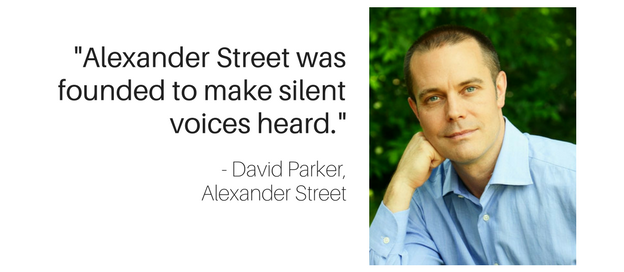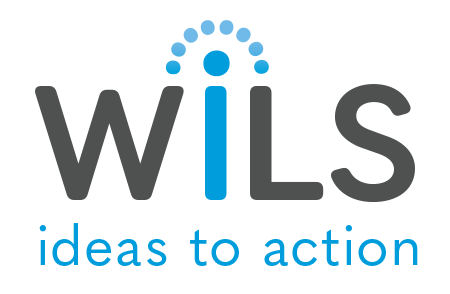
At WiLS, we want to bring valuable information to our library partners, including information about the missions and big ideas of the vendors they may already do business with. Each month, WiLS interviews a vendor partner in order to bridge the gap and open the door to valuable collaborations. This month, we share insights from David Parker, Senior Vice President of Editorial and Licensing at Alexander Street.
Tell us about your company’s background.
Alexander Street was founded to make silent voices heard. In practical terms, this means our mission has always been to digitize, curate, and make searchable and discoverable important, hard-to-find content for researchers and learners. We began with archives and rare print materials then moved into streaming audio in 2002 and streaming video in 2006. To date, we have created more than 100 important digital collections across the social sciences and humanities and we keep them coming. This year we are especially proud of our contributions to Borders and Migrations studies with a new collection. And we also launched an exciting new collection in anthropology that features the first ever effort to digitize the fieldwork notes of the seminal anthropologists of the 20th century, including Margaret Mead and Bronislaw Malinowski.
Our streaming video business has evolved in recent years away from a focus on curated, thematic collections to distributing video in large aggregation, cross-disciplinary packages and PDA. We still offer the occasional thematic video collection, such as our soon-to-launch partnership with Symptom Media, a provider of video designed to train psychologists and counselors in recognizing common presenting conditions; however, our primary focus in streaming video is on providing the most content with the most choice in method of acquisition. With more than 70,000 titles growing daily and acquisition options ranging from a single title to massive collections, and with both subscription and perpetual access options, we feel we have positioned ourselves as the go-to provider of streaming video.
Why do you, personally, choose to work with libraries?
I reluctantly left graduate school and a role as a teaching assistant in 1999 and embarked on my career. I told myself I would always keep one foot in the academy and one foot in business. I had the good fortune to conduct original research and to do deep dives into obscure and hard-to-find content in the pursuit of my studies. While my faculty advisers offered counsel on my topic of research it was the subject librarian and the library that provided me with the real means to pursue my scholarship. I have worked in both the educational space as an editor-in-chief for Pearson in the books business and in the scholarly space creating database collections at Alexander Street. It’s no secret that the library embraced digital technology and digital products much more rapidly than the classroom. The pace of innovation and new technology uptake in the library side of the university has, in my opinion, far outpaced that of the learning delivery side of the university and for this reason, I have personally found greater challenge and greater opportunity serving the library.
What do you like to know about the libraries you work with? What helps you better understand their needs?
My conversations with librarians always explore four key areas: content needs, acquisition model/business model preferences, data and usage analysis, and user experience. The focus or emphasis, of course, changes depending on the role of the particular librarian, whether he or she is a subject librarian, in collection development, or from library administration. But these topics of discussion help me to align both our offerings and our future content offerings with preferred and emerging models for content acquisition. Also, conversations about user experience and data management are central to how we think about investment in our platform and our back-end admin portal.
What big ideas are being worked on at your company? What problems are being solved?
Let me highlight three key initiatives. First is our commitment to open resources. This past year we launched the Open Music Library to create the world’s largest open repository for the study of music. This is significant in that it allows Alexander Street patrons to seamlessly move back and forth between open and for-fee content on our platform. Second is our newly launched effort to launch, test, and establish impact measures around video assets. Usage and engagement statistics tell an important story, but they miss impact. Did a video better prepare a student for an exam? Did a video form the backbone of a professor’s lecture? Did the inclusion of quizzing questions within a video improve student retention of a key concept? Current measures that capture minutes viewed or social media shares are important but insufficient. Third, with our launch of Anthropological Fieldwork Online we introduced a new method to bring open archival content into the digital world. We dedicate a percentage of each sale to the digitization of open but physical-only archives. This is important in that most efforts to fund open archives have failed to deliver significant progress and we recognized that a scholar using Anthropological Fieldwork Online, for example, needs as complete a research experience as possible and this means finding a method to bring open and for-fee content into one resource.
How can librarians become partners in product or training development?
We have faculty and librarian adviser panels in place for initiatives across our platform and for specific collections and products we build. My best advice is let your Alexander Street salesperson know you are interested in serving as an adviser or consultant and we will seek to align you to our current product or platform initiatives.
——————————
This interview is part of a series of interviews with both WiLS library and vendor partners. Your feedback is appreciated. If you have any to offer on this article, or suggestions for upcoming interviews, contact Andrea Coffin at acoffin@wils.org.
